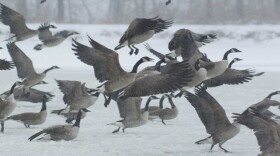Owls: A bird you hear at night but rarely catch a glimpse of during the day. What’s the story with this ever-elusive fowl?
Throughout history, owls have established a solid place in storytelling. Today, we appreciate owls for their role in the environment and for their enjoyable calls.
The barred owl, great horned owl and eastern screech-owl are commonly found in our area. These owls frequently call during winter. They prefer deep woods around rivers and swamps, and usually save their choruses for the darker hours. Should you hear a barred owl, try calling back. They usually respond to imitated calls and sometimes even approach the caller.
The legendary “hoot owl” is the great horned owl. It has wide-set ear tufts, a reddish, brown or gray face and a white throat. The iris is yellow. The upper parts are mottled brown; the underparts are light with brown barring. They prefer forests, suburbs, city parks and open countryside. Its call is a series of hoots, similar in quality to the barred owl’s. And they, too, will respond when you imitate their call.
The little screech-owl likes farms, towns, woods and orchards, ad it eats smaller prey—beetles, grasshoppers, moths, mice, shrews, moles, crayfish, fish, frogs and small birds. Like other owls, this species uses its exceptional senses of hearing and sight to home in on its targets. Its call is not a screech or a hoot, but a soft, mournful whinny. The call might even sound a bit spooky if you don’t know its origin.
More information about owls in Missouri can be found online at MissouriConservation.org.


